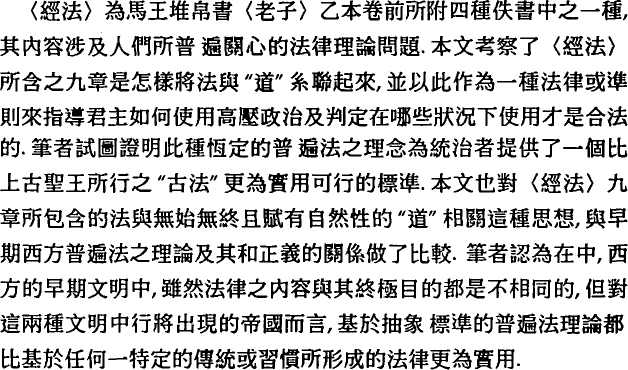Other
Contributors
-
- Published online by Cambridge University Press:
- 26 March 2015, pp. iii-iv
-
- Article
- Export citation
Abstract
Abstracts
-
- Published online by Cambridge University Press:
- 26 March 2015, pp. v-ix
-
- Article
-
- You have access
- Export citation
Articles
Some Notes on the Organization of the Han Dynasty Bamboo “Annals” Found at Fuyang
-
- Published online by Cambridge University Press:
- 26 March 2015, pp. 1-25
-
- Article
- Export citation
The Wang Bi Recension of the Laozi
-
- Published online by Cambridge University Press:
- 26 March 2015, pp. 27-54
-
- Article
- Export citation
The Theory of Law in the Ching-fa
-
- Published online by Cambridge University Press:
- 26 March 2015, pp. 55-76
-
- Article
- Export citation
Forum
The Early China Forum An Examination of Whether the Charges in Shang Oracle-Bone Inscriptions are Questions*
-
- Published online by Cambridge University Press:
- 26 March 2015, pp. 77-114
-
- Article
- Export citation
The “Question” Question*
-
- Published online by Cambridge University Press:
- 26 March 2015, pp. 115-125
-
- Article
- Export citation
Comments
Forum: Fan Yuzhou

-
- Published online by Cambridge University Press:
- 26 March 2015, pp. 127-133
-
- Article
- Export citation
Forum: Jao Tsung-i

-
- Published online by Cambridge University Press:
- 26 March 2015, pp. 133-138
-
- Article
- Export citation
Forum: David N. Keightley
-
- Published online by Cambridge University Press:
- 26 March 2015, pp. 138-146
-
- Article
- Export citation
Forum: Jean A. Lefeuvre
-
- Published online by Cambridge University Press:
- 26 March 2015, pp. 146-148
-
- Article
- Export citation
Forum: Li Xueqin

-
- Published online by Cambridge University Press:
- 26 March 2015, pp. 148-150
-
- Article
- Export citation
Forum: David S. Nivison
-
- Published online by Cambridge University Press:
- 26 March 2015, pp. 150-155
-
- Article
- Export citation
Forum: Edward L. Shaughnessy
-
- Published online by Cambridge University Press:
- 26 March 2015, pp. 155-160
-
- Article
- Export citation
Forum: Wang Yuxin

-
- Published online by Cambridge University Press:
- 26 March 2015, pp. 160-164
-
- Article
- Export citation
Response
Response: Qiu Xigui
-
- Published online by Cambridge University Press:
- 26 March 2015, pp. 165-172
-
- Article
- Export citation
Reviews
Oracle-Bone Collections In Great Britain: A Review Article
-
- Published online by Cambridge University Press:
- 26 March 2015, pp. 173-182
-
- Article
- Export citation
Images of Allegory: A Review Article
-
- Published online by Cambridge University Press:
- 26 March 2015, pp. 183-200
-
- Article
- Export citation
Guanzi Xuekan

-
- Published online by Cambridge University Press:
- 26 March 2015, pp. 201-211
-
- Article
- Export citation
KOSHI SHUNJŪ

-
- Published online by Cambridge University Press:
- 26 March 2015, pp. 213-226
-
- Article
- Export citation


 and
and  , and true-or-false type charges that contain
, and true-or-false type charges that contain  V” (such as “rain not rain” [
V” (such as “rain not rain” [ ]) and “V
]) and “V  , “do not use”). Charges that can now be determined not to be questions are mainly in those inscriptions with complex charges, such as “this *spring the king ought not ally with Wang Cheng to attack Xia Wei, (for if he does) he will not receive divine assistance” (
, “do not use”). Charges that can now be determined not to be questions are mainly in those inscriptions with complex charges, such as “this *spring the king ought not ally with Wang Cheng to attack Xia Wei, (for if he does) he will not receive divine assistance” ( , and “On
, and “On  ), the syntax of which shows that they cannot be questions.
), the syntax of which shows that they cannot be questions.




